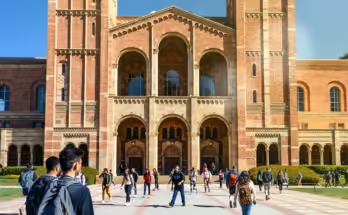Introduction
The University of Pennsylvania (Penn), located in Philadelphia, Pennsylvania, is one of the oldest and most prestigious institutions of higher education in the United States. Founded in 1740 by Benjamin Franklin, Penn is a member of the Ivy League and is renowned for its rigorous academic programs, influential research, and vibrant campus life. This article delves into the rich history, academic excellence, innovative research, campus culture, and notable alumni that define the University of Pennsylvania.
History
Founding and Early Years
The University of Pennsylvania was founded by Benjamin Franklin, a polymath who was deeply invested in education and innovation. Franklin envisioned an institution that combined practical education with classical studies, a novel concept at the time. Initially established as a charity school in 1740, the institution evolved into an academy in 1751 and was chartered as the College of Philadelphia in 1755.
The university’s early years were marked by significant contributions to the American Enlightenment and the intellectual development of the fledgling nation. It played a crucial role in educating leaders who would go on to shape the United States.
19th and 20th Centuries
In the 19th century, the university expanded its curriculum and infrastructure. It became the first American institution to offer both undergraduate and graduate studies, setting a precedent for other universities. The establishment of the Wharton School in 1881, the world’s first collegiate business school, marked a significant milestone in business education.
The 20th century saw Penn continue to innovate and grow. The university became a hub for research and development, particularly during and after World War II. The establishment of the School of Engineering and Applied Science, the School of Medicine, and other professional schools solidified Penn’s reputation as a comprehensive research university.
Academic Excellence
Undergraduate Programs
Penn offers a wide range of undergraduate programs across its four schools: the College of Arts and Sciences, the School of Engineering and Applied Science, the Wharton School, and the School of Nursing. Each school provides a robust curriculum designed to foster critical thinking, creativity, and practical skills.
The College of Arts and Sciences is the largest of the four undergraduate schools, offering majors in the humanities, social sciences, and natural sciences. The School of Engineering and Applied Science is known for its cutting-edge research and innovative programs in areas such as computer science, bioengineering, and mechanical engineering.
The Wharton School, consistently ranked among the top business schools globally, offers undergraduate programs in economics, finance, management, and other business-related fields. The School of Nursing, one of the oldest and most respected nursing schools in the country, provides a rigorous education in healthcare and nursing practice.
Graduate and Professional Programs
Penn is renowned for its graduate and professional programs, which attract students from around the world. The university offers a wide range of master’s and doctoral programs through its 12 graduate schools, including the Perelman School of Medicine, the Law School, and the Graduate School of Education.
The Perelman School of Medicine, established in 1765, is the oldest medical school in the United States. It is a leader in medical education, research, and patient care. The Law School, founded in 1850, is known for its interdisciplinary approach to legal education, offering joint degree programs with other Penn schools.
The Graduate School of Education is dedicated to improving education through research, policy, and practice. It offers programs in educational leadership, counseling, and teaching, among others.
Research and Innovation
Research Centers and Institutes
Penn is home to numerous research centers and institutes that drive innovation across various fields. These centers bring together scholars, researchers, and students to tackle complex challenges and advance knowledge.
The Penn Institute for Computational Science is a leader in computational research, focusing on areas such as bioinformatics, materials science, and climate modeling. The Penn Center for Innovation facilitates the translation of academic research into commercial products and services, fostering entrepreneurship and industry partnerships.
The Leonard Davis Institute of Health Economics is a leading research center for health policy and economics, addressing issues such as healthcare access, quality, and cost. The Annenberg School for Communication conducts cutting-edge research on media, communication, and public opinion.
Notable Research Achievements
Penn has a long history of groundbreaking research and discoveries. The development of the first general-purpose electronic computer, ENIAC, in the 1940s is one of the university’s most significant contributions to technology. This innovation laid the foundation for the modern computing era.
In the field of medicine, Penn researchers have made significant advancements in cancer treatment, gene therapy, and neuroscience. The discovery of the Philadelphia chromosome, a genetic abnormality linked to chronic myelogenous leukemia, revolutionized cancer research and treatment.
The university’s commitment to interdisciplinary research has led to numerous collaborations and breakthroughs. Penn’s work in fields such as nanotechnology, robotics, and renewable energy continues to push the boundaries of science and technology.
Campus Life
Student Organizations and Activities
Penn boasts a vibrant campus life with a wide array of student organizations and activities. With over 450 student-run clubs and organizations, students have ample opportunities to explore their interests, develop leadership skills, and connect with peers.
The university’s cultural and affinity groups celebrate diversity and promote inclusion. These organizations provide a supportive community for students from various backgrounds and foster cross-cultural understanding. Penn also has a thriving arts scene, with numerous student groups dedicated to music, theater, dance, and visual arts.
The Daily Pennsylvanian, the student-run newspaper, provides a platform for aspiring journalists and serves as a vital source of campus news. The Penn Student Government, composed of elected student representatives, advocates for student interests and plays a key role in shaping university policies.
Athletics and Recreation
Athletics play a significant role in campus life at Penn. The university’s athletic teams, known as the Quakers, compete in the Ivy League and NCAA Division I. Penn has a rich tradition of athletic excellence, with successful programs in sports such as basketball, football, rowing, and track and field.
The Palestra, Penn’s historic basketball arena, is one of the most iconic venues in college sports. Franklin Field, the university’s football stadium, is the oldest operating stadium in the country and has hosted numerous historic events.
In addition to varsity sports, Penn offers extensive intramural and club sports programs, providing opportunities for students of all skill levels to participate in recreational activities. The Pottruck Health and Fitness Center is a state-of-the-art facility that offers fitness classes, personal training, and wellness programs.
Housing and Dining
Penn provides a variety of housing options for students, ranging from traditional residence halls to apartment-style living. The university’s residential system is designed to create a supportive and inclusive community, with each residence offering unique programs and activities.
First-year students typically live in one of the university’s college houses, which provide a mix of academic and social programming. Upperclassmen have the option to live in apartment-style housing, fraternity and sorority houses, or off-campus apartments.
Penn Dining offers a diverse array of dining options, catering to various dietary preferences and needs. The university’s dining halls serve a wide range of cuisines, and there are numerous cafes, food trucks, and restaurants on campus and in the surrounding area.
Notable Alumni
The University of Pennsylvania has a long list of distinguished alumni who have made significant contributions to various fields, including business, politics, science, and the arts.
Business and Entrepreneurship
Many Penn alumni have achieved great success in the business world. Donald Trump, the 45th President of the United States, is a Wharton graduate. Other notable business leaders include Warren Buffett, one of the world’s most successful investors, and Elon Musk, founder of Tesla and SpaceX.
Wharton alumni have founded and led numerous Fortune 500 companies, including General Electric, Johnson & Johnson, and Comcast. The school’s emphasis on entrepreneurship has also produced many successful startups and venture capitalists.
Politics and Public Service
Penn alumni have played significant roles in politics and public service. Besides Donald Trump, other prominent political figures include William Henry Harrison, the 9th President of the United States, and Jon Huntsman Jr., former Governor of Utah and U.S. Ambassador to China and Russia.
Penn graduates have also served in Congress, the judiciary, and various governmental agencies. The university’s influence extends to international politics as well, with alumni holding leadership positions in numerous countries.
Science and Medicine
Penn has produced many influential scientists and medical professionals. Baruch S. Blumberg, a Penn professor, won the Nobel Prize in Physiology or Medicine for his discovery of the hepatitis B virus. Michael S. Brown and Joseph L. Goldstein, both Penn alumni, were awarded the Nobel Prize in Physiology or Medicine for their work on cholesterol metabolism.
In addition to Nobel laureates, Penn alumni include pioneers in fields such as genetics, immunology, and bioengineering. The university’s emphasis on interdisciplinary research has led to numerous collaborations and breakthroughs in science and medicine.
Arts and Humanities
Penn alumni have made significant contributions to the arts and humanities. Notable writers include William Carlos Williams, a leading figure in modernist poetry, and Jennifer Egan, a Pulitzer Prize-winning novelist. In the field of journalism, alumni include Andrea Mitchell, NBC News Chief Foreign Affairs Correspondent, and Ezra Klein, co-founder of Vox.
In the performing arts, Penn graduates include John Legend, an award-winning singer, songwriter, and actor, and Elizabeth Banks, a successful actress, director, and producer. The university’s emphasis on a well-rounded education has produced many alumni who excel in multiple disciplines.
Community Engagement and Social Impact
Local and Global Initiatives
Penn is deeply committed to community engagement and social impact. The university’s Netter Center for Community Partnerships is a leader in university-community collaboration, working to improve education, health, and economic development in West Philadelphia and beyond.
Penn’s global initiatives include partnerships with institutions around the world, study abroad programs, and research collaborations. The Perry World House serves as a hub for global engagement, bringing together scholars, policymakers, and students to address pressing global issues.
The Penn Center for Health Equity focuses on reducing health disparities and improving access to healthcare for underserved populations. Through research, education, and community outreach, the center works to address social determinants of health and promote health equity.
Sustainability and Environmental Initiatives
Penn is dedicated to sustainability and environmental stewardship. The university’s Climate Action Plan outlines a comprehensive strategy for reducing carbon emissions, promoting sustainable practices, and integrating sustainability into the curriculum.
The Penn Sustainability Office coordinates efforts across campus to reduce waste, conserve energy, and promote sustainable transportation. The university’s green buildings, energy-efficient infrastructure, and sustainable landscaping practices demonstrate its commitment to environmental responsibility.
Penn’s research in environmental science and policy addresses critical issues such as climate change, renewable energy, and conservation. The Kleinman Center for Energy Policy provides a platform for research, education, and policy analysis on energy and environmental issues.
Conclusion
The University of Pennsylvania stands as a testament to the power of education, research, and innovation. From its founding by Benjamin Franklin to its current status as a global leader in higher education, Penn has remained committed to its mission of producing knowledge, advancing society, and fostering a diverse and inclusive community.
With its rich history, academic excellence, groundbreaking research, vibrant campus life, and influential alumni, Penn continues to shape the future and make a positive impact on the world. As it looks to the future, the University of Pennsylvania remains dedicated to upholding its legacy of excellence and addressing the challenges of the 21st century.



